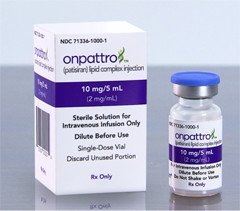FDA Approves First RNAi Therapy
Quick Links
The Food and Drug Administration has approved patisiran, the first-ever therapeutic based on RNA interference (RNAi). It treats a rare, progressive polyneuropathy caused by hereditary transthyretin-mediated (hATTR) amyloidosis, which afflicts about 50,000 people worldwide. Made by the Cambridge, Massachusetts-based Alnylam Pharmaceuticals (press release), patisiran delivers small interfering RNAs (siRNAs) to the liver, where they bind and degrade transthyretin messenger RNA. Transthyretin normally carries vitamin A through the blood, but when mutated, it forms amyloid fibers in cells, causing heart, nervous system, and gastrointestinal tract symptoms that are often fatal. Granted Orphan Drug, Fast Track, Priority Review, and Breakthrough Therapy designations by the FDA to expedite the regulatory process, patisiran is the first drug approved to treat hATTR amyloidosis.
- An RNAi-based therapy has been approved for patients in the U.S. for the first time.
- Patisiran targets mRNAs for mutated transthyretin, which causes peripheral amyloidosis.
- Approval paves the way for other drugs using same technology.
Approval follows recently published positive results of the Phase 3 APOLLO trial (Adams et al., 2018). Alzforum reported on these findings when they were presented at the American Academy of Neurology annual meeting in April (May 2018 conference news). In the trial, 225 patients were intravenously infused with drug or placebo every three weeks for 18 months. The drug met its primary endpoint, improving scores on the modified Neuropathy Impairment Score+7 by six points relative to the average baseline score of 80. That compares to a 28-point worsening in the placebo group. The test assesses motor strength, reflexes, sensation, and nerve conduction. Patisiran also improved activities of daily living, quality of life, walking speed, and slowed weight loss. More than half of people on the drug improved relative to their own baseline, suggesting the peripheral nerve impairment caused by their disease was reversed.

Patisiran costs $450,000 per year. Next month it will undergo review by the European Commission, with regulatory filings in other countries, including Japan, planned for later this year. Alnylam has other RNAi-based drugs in the pipeline for hypercholesterolemia, complement-mediated diseases, hemophilia, and other rare bleeding disorders.
The company also plans to use siRNA technology to tackle forms of Alzheimer’s, Huntington’s, Parkinson’s, and amyotrophic lateral sclerosis that are caused by dominantly inherited genes. The company has designed an siRNA that can enter the CNS and neurons and has tested it in rodents. Human studies have not been reported.—Gwyneth Dickey Zakaib
References
News Citations
Paper Citations
- Adams D, Gonzalez-Duarte A, O'Riordan WD, Yang CC, Ueda M, Kristen AV, Tournev I, Schmidt HH, Coelho T, Berk JL, Lin KP, Vita G, Attarian S, Planté-Bordeneuve V, Mezei MM, Campistol JM, Buades J, Brannagan TH 3rd, Kim BJ, Oh J, Parman Y, Sekijima Y, Hawkins PN, Solomon SD, Polydefkis M, Dyck PJ, Gandhi PJ, Goyal S, Chen J, Strahs AL, Nochur SV, Sweetser MT, Garg PP, Vaishnaw AK, Gollob JA, Suhr OB. Patisiran, an RNAi Therapeutic, for Hereditary Transthyretin Amyloidosis. N Engl J Med. 2018 Jul 5;379(1):11-21. PubMed.
External Citations
Further Reading
Annotate
To make an annotation you must Login or Register.

Comments
No Available Comments
Make a Comment
To make a comment you must login or register.